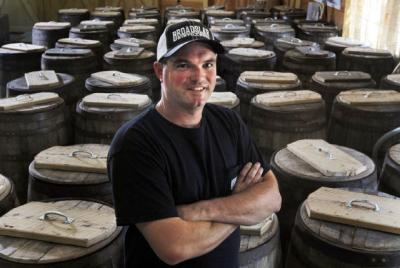 Jeremy Norris now producing several "shine" products and two rum spirits.
Jeremy Norris now producing several "shine" products and two rum spirits.
Jeremy Norris was always intrigued by his grandfather's stories of making whiskey in the woods, sampling the product by moonlight, and the tales of hiding from lawmen who came to bust up the stills.
Of course, Jeremy's grandfather was a bootlegger. In fact, the Norris family has been making whiskey in the woods of Johnston County since the 1700s.
Norris is carrying on the family tradition, but now in a completely legal way. Broadslab Distillery, located near Benson, has been legally manufacturing spirits since 2012 on the land once owned by his grandfather. But now Jeremy can stay out in the open and out of trouble with the law.
Although distilled spirits have a long way to go to catch up with beer and wine, they’re a growing business in North Carolina. Agnes Stevens, public affairs director for the state ABC Commission, said there are 14 working distilleries in the state, with more on the way. The oldest is Piedmont Distillers in Madison, which started producing liquor in 2005.
Distilleries were outlawed in North Carolina in 1909, 11 years before Prohibition went into effect. After Prohibition ended in 1932, the state permitted breweries and wineries to operate, but continued to ban the manufacturing of spirits. That ban was lifted in 1979.
It looks like distilleries are following the same growth pattern that wineries and breweries have in North Carolina -- which are booming!
Distillery operators must obtain a permit from the federal department of Alcohol and Tobacco Tax and Trade Bureau, a state ABC permit and a city or county business license. Labels must also be approved. Bottles can only be sold at state ABC stores, which are required to have a separate section for North Carolina-made products. Before Prohibition, North Carolina had more distilleries than any other state.
Read All About Us!
For more than ten years, the staff of the Johnston County Visitors Bureau has been curating unique content about the people, places, food, attractions, and shopping throughout Johnston County to share with you, our visitors! Keep in touch and read our weekly blog posts -- and we hope you visit us soon! #visitjoco

Donna Bailey-Taylor
Donna Bailey-Taylor started as the Director of the Visitors Bureau in August 1996, and continues to love her job and promoting the county. Donna has deep roots in the county as her father's family is from Benson and her mother was born in Clayton. Donna has big dreams for the county in the area of tourism development, hoping the Mountains to the Sea Trail will be completed between Clayton and Smithfield and the new Visitor Center/Museum at Bentonville Battlefield will happen. There are many tourism development projects in the works and it's an exciting time for tourism growth in the county. Keep in touch via Donna's blog!





